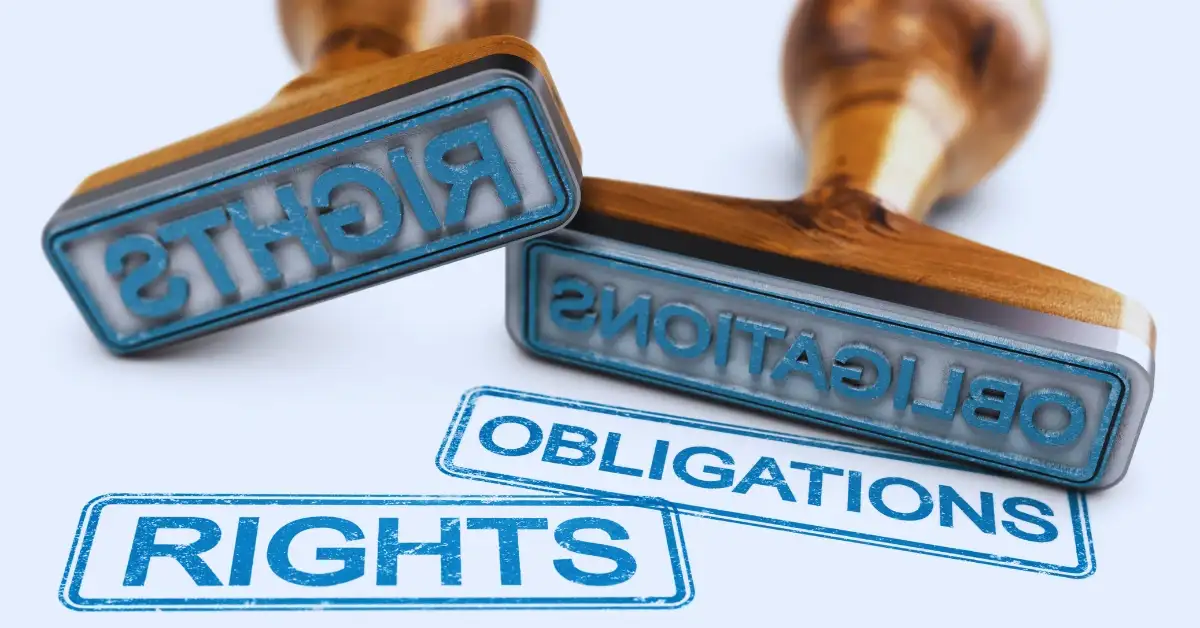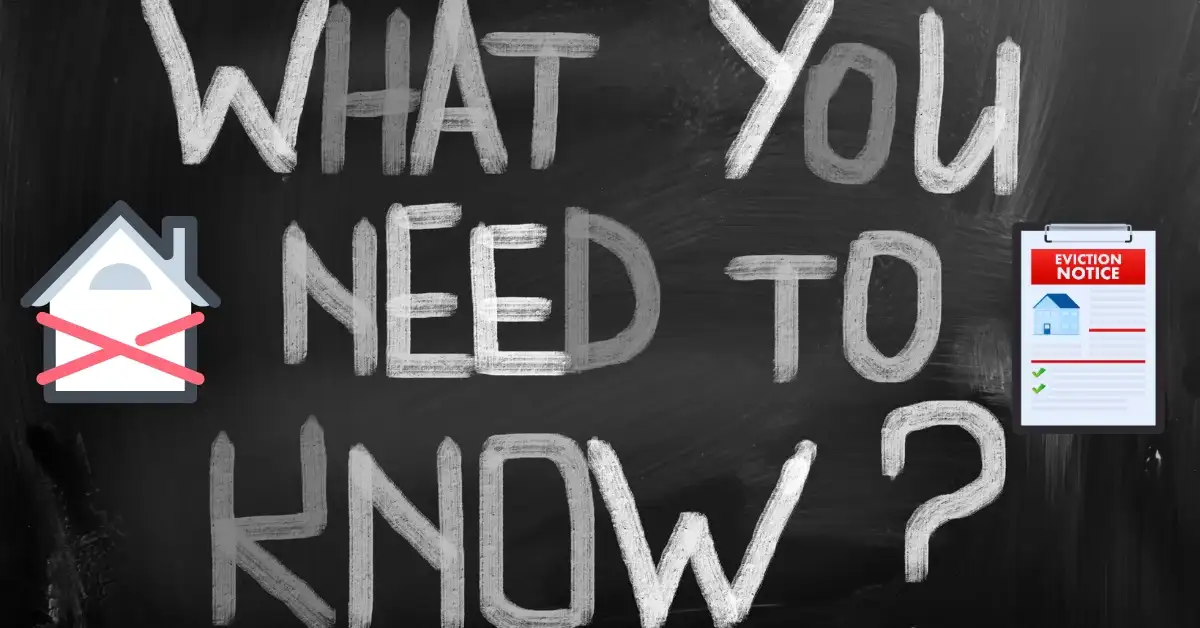My Landlord Wants Me Out What Are My Rights?
Facing an unexpected eviction notice? Understanding your tenant rights is crucial.
Before you pack your bags, get informed. Our comprehensive guide sheds light on your legal protections and steps to take. Stand your ground with confidence and knowledge.

My Landlord Wants Me Out What Are My Rights?
When your landlord wants you out, you have specific legal rights and protections to ensure you are not arbitrarily evicted. These rights can differ by jurisdiction but generally include the requirement of notice, the right to due process, and protection against unlawful eviction.
Understanding Eviction Notices
A proper understanding of eviction notices is pivotal for tenants. Landlords are legally required to provide written notice before eviction proceedings can commence.
The notice period varies, but it usually ranges from 30 to 60 days, allowing tenants ample time to either address the issue or find new accommodation.
This notice must be clear, stating the reason for eviction and the time frame in which the tenant must vacate the premises.
Tenant Rights During Landlord-Initiated Evictions
1. a Habitable Home
Your rights as a tenant encompass the assurance of a livable dwelling, upheld by federal, state, and local laws.
Your landlord must offer you a residence that’s secure, clean, and equipped with functional utilities, appliances, plumbing, heating, ventilation, and security measures.
Moreover, they’re obligated to promptly mend issues that endanger your health or safety, such as leaks, mold, pests, or broken locks.
2. Privacy
As a tenant, you hold the privilege of privacy, safeguarded by legal provisions.
Your landlord is prohibited from entering your abode without your consent or without serving proper notice, unless a pressing emergency or court order prevails.
It’s also your entitlement to be free from harassment, surveillance, or disruptions to your peaceful enjoyment of your living space.
3. Due Process
Equity prevails through the right to due process, ensuring your protection against unjust eviction.
Your landlord cannot oust you without adhering to legal protocols and affording you the opportunity to defend yourself in court.
Seizing your possessions, disconnecting utilities, or changing locks necessitates a court decree.
4. Freedom From Discrimination

Tenant rights encompass freedom from discrimination, encompassing various facets of identity.
Your landlord cannot reject your tenancy, inflate rent, or treat you disparately based on attributes like race, color, religion, sex, national origin, disability, or familial status.
In some jurisdictions, safeguarded classes extend to sexual orientation, gender identity, age, marital status, income source, and more.
5. Reasonable Accommodations
If you possess a disability, your tenant rights guarantee reasonable accommodations.
Your landlord is obligated to make rational adjustments to the property or regulations to ensure your comfort and safety.
This could entail the installation of ramps, widening of doorways, or permitting the presence of a service animal.
Steps to Take If Your Landlord Wants You Out
If your landlord wants you out of your home, they must have a valid reason and follow the legal process. Some of the valid reasons for eviction include:
- Nonpayment of rent
- Lease violations
- Property sale
- Renovations
- Owner occupation
However, even if your landlord has a valid reason for eviction, they cannot evict you without giving you proper notice and an opportunity to correct the problem or move out voluntarily.
If they try to evict you illegally or unfairly, you can take the following steps to protect yourself:
Review Lease Agreements
The first thing you should do if your landlord wants you out is to review your lease agreement and see what it says about eviction.
Your lease may specify how much notice your landlord must give you before evicting you, what kind of violations can lead to eviction, and what remedies you have if you disagree with the eviction.
Your lease may also have clauses that protect you from eviction in certain situations, such as if you have paid rent in advance or if you have lived in the property for a long time.
Consult Legal Aid
The next thing you should do is to consult a lawyer or a legal aid organization that specializes in tenant rights.
They can help you understand your rights and options under the law and advise you on how to respond to your landlord’s notice or lawsuit.
They can also help you negotiate with your landlord or represent you in court if necessary.
Document All Interactions
Another important step is to document all interactions with your landlord regarding the eviction.
This includes keeping copies of all written notices, letters, emails, texts, or messages from your landlord; recording all phone calls or conversations with your landlord; taking pictures or videos of any problems or damages in your home; and getting statements from witnesses who can support your case.
These documents can serve as evidence if you need to prove that your landlord violated the law or acted in bad faith.
Seek Mediation
Sometimes, it may be possible to resolve the eviction dispute without going to court.
You can try to seek mediation with your landlord, which is a process where a neutral third party helps you and your landlord communicate and reach a mutually acceptable agreement.
Mediation can save you time, money, and stress, and can preserve your relationship with your landlord.
However, mediation is voluntary and both parties must agree to participate and abide by the outcome.
Consider Moving Out Voluntarily
Finally, you may want to consider moving out voluntarily if you cannot afford to pay rent, fix the problem, or fight the eviction in court.
Moving out voluntarily can help you avoid having an eviction on your record, which can make it harder for you to rent in the future.
It can also help you avoid paying additional fees or damages to your landlord.
However, before you move out voluntarily, you should make sure that your landlord agrees to release you from the lease and any liability, and that you get this agreement in writing.
The Eviction Process: What to Expect
The eviction process may vary depending on where you live and what kind of eviction it is, but it generally involves the following steps:

Notice Period
Before your landlord can file an eviction lawsuit against you, they must give you a written notice that states the reason for the eviction and the deadline for you to pay rent, fix the problem, or move out.
The notice period may range from a few days to a few months depending on the state and the reason for eviction.
If you comply with the notice within the given time frame, your landlord cannot evict you. If you do not comply, your landlord can proceed to the next step.
Court Hearing
After the notice period expires, your landlord can file an eviction lawsuit against you in the local court.
You will receive a summons and a complaint that tell you when and where the court hearing will take place and what claims your landlord is making against you.
You must respond to the summons and complaint within a certain time frame (usually a few days or weeks) and state whether you admit or deny the claims and whether you have any defenses or counterclaims.
If you do not respond or show up at the hearing, your landlord will win by default and get a judgment of eviction against you.
At the court hearing, both you and your landlord will have a chance to present your evidence and arguments to a judge or a jury.
The judge or jury will then decide whether to grant or deny the eviction based on the facts and the law.
If they grant the eviction, they will issue a writ of possession that gives your landlord the right to take back the property.
If they deny the eviction, they will dismiss the case and allow you to stay in the property.
The Actual Eviction
If your landlord wins the eviction lawsuit and gets a writ of possession, they can use it to evict you from the property with the help of law enforcement officers.
The officers will give you a final notice that tells you when they will come to execute the writ of possession and remove you from the property.
The notice may be as short as 24 hours or as long as 10 days depending on the state. You must move out by then or face forcible removal.
When the officers come to execute the writ of possession, they will escort you out of the property and allow your landlord to change the locks.
They will also supervise as your landlord removes your belongings from the property and places them in storage or on the curb.
You may have to pay for the storage fees or risk losing your belongings if they are left unattended.
After Eviction: What Next?
There are some steps you can take to cope with these challenges and move on with your life:
- Seek assistance from local agencies or organizations that provide emergency housing, financial aid, counseling, or other services for evicted tenants.
- Apply for public housing or subsidized housing programs that offer affordable rents for low-income households.
- Look for alternative housing options such as renting a room, sharing an apartment, staying with friends or family, or living in a shelter.
- Negotiate with your former landlord to reduce or waive any fees or damages that they claim against you.
- Dispute any errors or negative information on your credit report or rental history report that may affect your ability to rent in the future.
- Learn from your experience and avoid making the same mistakes that led to your eviction.
State and Local Laws That Protect Tenants
Here are some sources of information that can help you learn more about the state and local laws that protect tenants:
Federal Laws
The federal laws that protect tenants from discrimination, harassment, and retaliation are enforced by the U.S. Department of Housing and Urban Development (HUD).
You can visit their website to find out more about your rights and how to file a complaint if you believe your landlord has violated them.
You can also call their toll-free number at 1-800-669-9777 or use their online directory to find your local HUD office.
State Laws
The state laws that regulate the landlord-tenant relationship, such as the notice period, the eviction process, the security deposit, and the habitability standards, are enforced by the state courts and agencies.
You can visit the website of the National Housing Law Project to find a summary of the state laws in each state and links to the official sources.
You can also visit the website of Nolo, a legal publisher, to find more detailed information and resources on the state laws in each state.
Local Ordinances
The local ordinances that affect tenants, such as rent control, rent stabilization, just cause eviction, tenant relocation assistance, and tenant rights organizations, are enforced by the local governments and agencies.
You can visit the website of the National Low Income Housing Coalition to find a list of cities and counties that have local ordinances that protect tenants and links to their websites.
You can also visit the website of Just Shelter, a nonprofit organization, to find a map of local organizations that provide legal aid, advocacy, or education for tenants.
Common Reasons a Landlord May Want You Out
As we mentioned earlier, your landlord must have a valid reason to evict you from your home.
However, some landlords may have ulterior motives or personal reasons to want you out. Some of the common reasons a landlord may want you out are:
Lease Violations
Your landlord may want you out if you violate any terms or conditions of your lease agreement, such as:
- Failing to pay rent on time or in full.
- Having unauthorized guests or pets.
- Making excessive noise or causing disturbances.
- Damaging or altering the property without permission.
- Subletting or assigning the lease without consent.
- Engaging in illegal or immoral activities on the premises.
If you violate your lease agreement, your landlord may have the right to evict you after giving you a notice to cure or quit.
This means that you have a certain amount of time (usually 3 to 30 days) to fix the problem or move out. If you do not comply, your landlord can file an eviction lawsuit against you.
Property Sale
Your landlord may want you out if they decide to sell the property to another owner.
This may happen if your landlord is facing financial difficulties, wants to cash in on a rising market, or simply wants to change their investment strategy.
If your landlord wants to sell the property, they must follow certain rules and procedures depending on whether you have a fixed-term lease or a month-to-month lease.
If you have a fixed-term lease, your landlord cannot evict you before your lease expires unless they have a clause in your lease that allows them to do so.
If you have a month-to-month lease, your landlord can terminate your tenancy by giving you a notice of termination (usually 30 to 60 days) before the sale.
Renovations
Your landlord may want you out if they plan to renovate or remodel the property.
This may happen if your landlord wants to improve the condition or appearance of the property, increase its value or rentability, or comply with building codes or regulations.
If your landlord wants to renovate the property, they must follow certain rules and procedures depending on whether they need access to your unit or not.
If they need access to your unit, they must give you proper notice (usually 24 hours) and enter only during reasonable hours (usually 8 am to 5 pm).
If they need to vacate your unit temporarily or permanently, they must give you proper notice (usually 30 days) and relocate you to another unit or pay for your moving expenses.
Owner Occupation
Your landlord may want you out if they or their family members want to occupy the property themselves.
This may happen if your landlord wants to use the property as their primary residence, retire or relocate to the property, or provide housing for their relatives or dependents.
If your landlord wants to occupy the property, they must follow certain rules and procedures depending on whether you have a fixed-term lease or a month-to-month lease.
If you have a fixed-term lease, your landlord cannot evict you before your lease expires unless they have a clause in your lease that allows them to do so.
If you have a month-to-month lease, your landlord can terminate your tenancy by giving you a notice of termination (usually 30 to 60 days) before the occupation.
FAQs
Can my landlord evict me without a valid reason?
No, your landlord must have a valid reason for eviction and follow the legal process.
Is it possible to resolve eviction disputes without going to court?
Yes, mediation can help resolve eviction disputes without going to court.
Are there protections against discrimination in tenant rights?
Yes, tenant rights include protection against discrimination based on various attributes.
Do I have the right to privacy as a tenant?
Yes, you have the right to privacy in your rented space.
Does my landlord have to provide reasonable accommodations for my disability?
Yes, your landlord is obligated to provide reasonable accommodations for disabilities.
Is moving out voluntarily a good option to avoid eviction?
Moving out voluntarily can help you avoid an eviction record and additional fees.
Conclusion
Now that you understand your rights when your landlord wants you out, you’re empowered to navigate disputes with confidence.
Always remember your entitlements, from habitable conditions to lawful eviction procedures.
Armed with this newfound knowledge, you can face the challenges of the rental landscape and ensure a secure housing journey.
Reference
https://www.texasattorneygeneral.gov/consumer-protection/home-real-estate-and-travel/renters-rights